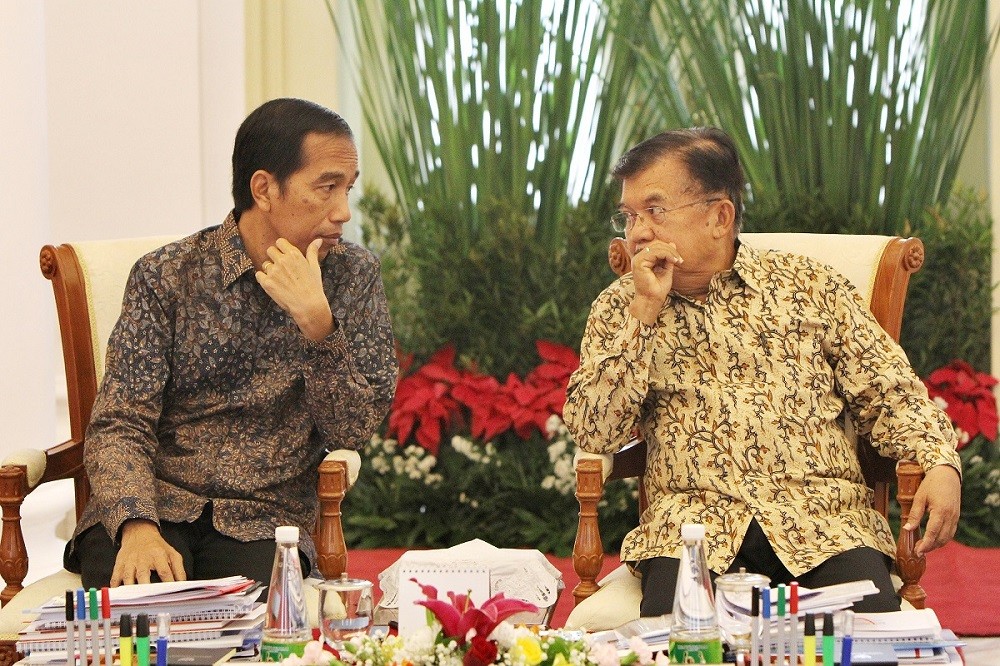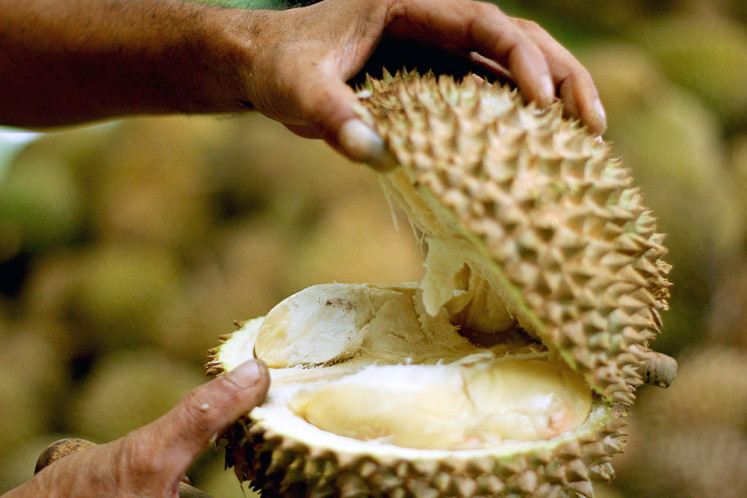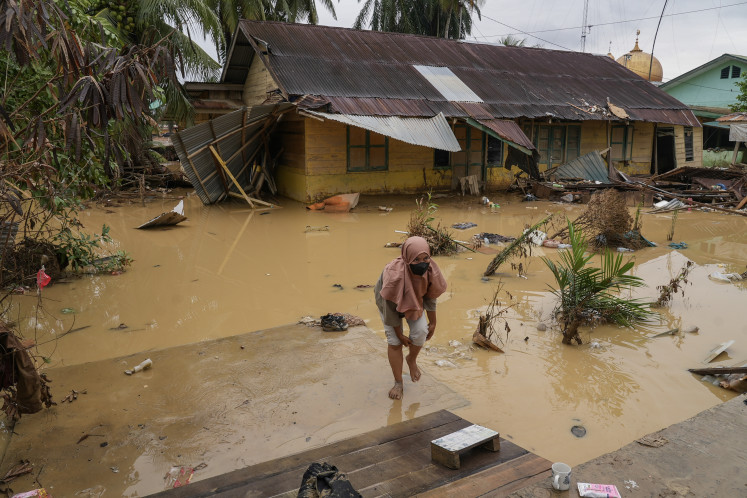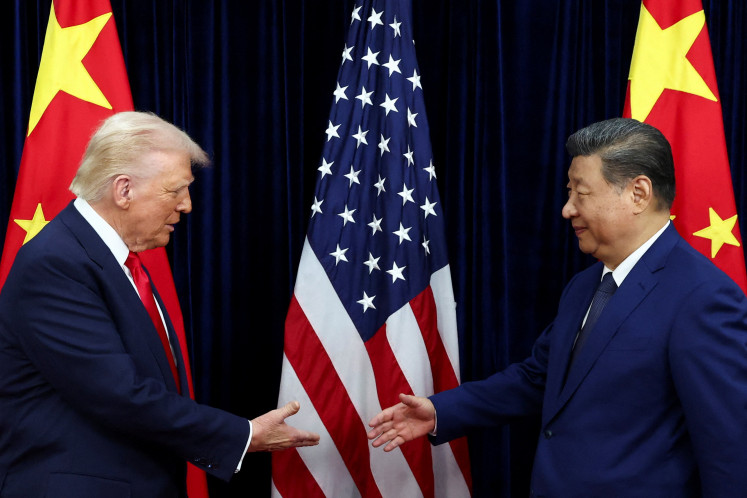Popular Reads
Top Results
Can't find what you're looking for?
View all search resultsPopular Reads
Top Results
Can't find what you're looking for?
View all search resultsCOMMENTARY: Price intervention: Cutting corners until there's nothing left to cut
Change text size
Gift Premium Articles
to Anyone
 Serious business: President Joko “Jokowi” Widodo (left) talks to Vice President Jusuf Kalla during a plenary Cabinet meeting to discuss government programs in 2017 at Bogor Palace in West Java on Wednesday. The goverment plans to focus on reducing the prosperity gap in society as well as the economic gap between regions. (Antara/Yudhi Mahatma)
Serious business: President Joko “Jokowi” Widodo (left) talks to Vice President Jusuf Kalla during a plenary Cabinet meeting to discuss government programs in 2017 at Bogor Palace in West Java on Wednesday. The goverment plans to focus on reducing the prosperity gap in society as well as the economic gap between regions. (Antara/Yudhi Mahatma)
I
f you find yourself going around in circles, maybe you’re cutting too many corners.” The proverb best describes how President Joko “Jokowi” Widodo’s penchant for taking shortcuts to lower prices of certain commodities may churn out another set of problems.
While it may be understandable for the prices of staple commodities, such as rice and soybeans, to be regularly controlled to cushion the poor or curb inflation, when such a policy is applied to gas, sugar, cement, fuel and beef, to name just a few, many questions will inevitably be raised.
Lower prices will undeniably give consumers the advantage, but it will be at the expense of producers as prices are unilaterally determined for them.
Operating in an environment where a high-cost economy is already pervasive, mostly as a result of a messy bureaucracy and appalling business infrastructure, price interventions are least desired by businesses.
Just last week, Jokowi renewed his demand for an immediate cut in gas prices for certain industries after officials claimed success in forcing suppliers to cut more than 35 percent off the commodity’s price for the petrochemical, fertilizer and steel industries. Gas accounts for 70 percent of production costs for petrochemical and fertilizer producers and 50 percent for steel manufacturers.
However, Jokowi’s latest instruction to lower gas prices for oleochemical, glass, ceramics and rubber glove industries have left many puzzled as it is thought that the impact will be minimal.
According to the Energy and Mineral Resources Ministry, gas accounts for less than 10 percent of production costs for the four industries and thus has no multiplier effects.
The ministry issued a decree late last year for the prices of gas to be pegged at US$6 per million metric British thermal units (mmbtu) for certain industries at the expense of suppliers’ profit margins.
State oil and gas company Pertamina and state-run gas distributor PT Perushaan Gas Indonesia are footing the bills as they have agreed to slash their profits for the policy to work.
The President’s intervention on gas prices has sent shivers down both producers and distributors’ spines because the prescribed solutions to lowering prices have hinged on nothing but thoughtless, shortsighted vision.
Around 60 percent of the gas price is determined by the upstream sector whereby contractors are tied down with long-term contracts, and it may be almost impossible to request an immediate price cut.
The midstream sector, where the gas is transported out of the production fields, contributes to 22 percent of the price while the downstream sector only accounts for 18 percent in the form of distribution, such as through pipelines.
However, since the end of last year, the public has been fed a fuss over the downstream sector’s mismanagement where the President has alleged the existence of a “mafia” that results in the country’s gas prices being the highest in the region at between $9 and $11 per mmbtu.
While the President seems to be going after a trivial part of the supply chain, the policy in general is already discouraging companies from becoming involved in the gas sector over concerns of price intervention impacting their profitability.
The government’s threat to import cheaper gas to force local suppliers to lower their prices may also be devastating for the sector in the long run — why bother investing to produce when operating as an importer is more lucrative?
Since 2015, price intervention policies have paved the way for more imports. Lots of them.
Mid last month, the Trade Ministry issued import permits for raw sugar, which will be refined, so that eight sugar refiners and 11 sugar distributors can keep the price of refined sugar at below Rp 12,500 (93 US cents), lower than the current market price, which varies between Rp 12,650 and Rp 17,250.
The government is expected to issue more licenses to import half of the 3.5 million tons of refined sugar demand this year to keep the prices low following a production decline as a result of “bad weather”.
Toying with price intervention and imports are not without precedent as there were several cases in 2015 and 2016. But the most notable was in relation to keeping beef prices below Rp 95,000 per kilogram.
The policy has faltered. Beef prices now continue to hover at above Rp 110,000 per kg and the country now imports half of its beef demand while local breeders no longer see any incentive to remain in operation.
Price intervention is also spreading to fuel and cement. Late last year, the President demanded suppliers sell the commodities in Papua at the same price as they sell in Java despite the extreme lack of highway networks in the remote region.
Pertamina has said the policy will cost it more than Rp 800 billion in losses to subsidize the air transportation costs for fuel.
The intervention policy not only distorts the market but also scares away business owners who have to bear the brunt of the government’s inability to increase supply productivity and provide sufficient infrastructure for distribution.
Jokowi’s price intervention is not a reflection of socialism and social justice, it is merely a tool to cut corners to seek the easiest way to nurturing his popularity, but at the cost of unleashing a new set of problems.









